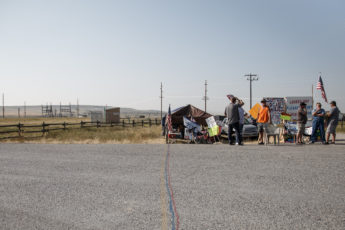From insurance programs to inspection fees, uncertainty ahead
Welcome back! Last time, we talked about why agriculture matters so much to all Montanans. We showed how our ranchers and farmers are taking advantage of every opportunity to get their products out there to the world.
You would think that our politicians would be doing everything they can to support and protect Montana’s agriculture. But that’s just not the case.
Back in May, the proposed federal budget was released. It would bring huge cuts to important programs that many Montanans rely on. The Farm Bureau, the National Farmers Union, and U.S. Wheat Associates all criticized the proposal. Ag groups were pretty upset. And we should all be, too. Remember, if ag does well, then our rural communities do well. And if ag doesn’t do well, then we’re all in for a rough ride.
So what would these cuts actually look like?
The Farm Service Agency-the agency that works to conserve our open spaces and farmlands-would be slashed.
The Farmer MAC Program-the financing program for farmers and ranchers-would be cut.
The Growth through Agriculture Grant Program-which granted 29 Montana businesses more than $592,000 in 2015 to help them innovate and expand-would also be cut.
The U.S. Forest Service, which manages 17 million acres of land in Montana, would see its budget go down while the cost of fighting fires goes up, hamstringing its ability to do the work that could help prevent some fires like the ones burning all over Montana right now.
The Department of Agriculture’s Statistical Capabilities could suffer huge cuts. Farmers and ranchers rely on that data to make smart marketing choices and planting decisions.
Inspection Fees aren’t set to be cut. They’d actually go up. That’s right. Farmers and ranchers would actually have to pay more for mandatory inspections for beef, poultry, and grain standardization. So they’ll be paying more money, while this budget would give them less support.
Crop insurance and safety nets would take a big hit. This budget would cut the federal crop insurance by 36 percent. That means that farmers and ranchers would have to pay higher premiums.
Hail damage to a sunflower crop in Montana
Montana’s farmers and ranchers rely on this program. In 2016, crop insurance covered $1.1 billion worth of output in Montana, and $72 million was paid out to farmers for their losses.
As the weather keeps getting weirder and weirder, farmers and ranchers are going to need these programs to stay afloat. Right now, Eastern Montana is experiencing a severe drought that is threatening people’s way of life. Hail, drought, late frost: All these forces are out of their control. What does D.C. expect those farmers and ranchers to do without that insurance? What will happen to our communities in Eastern Montana if the drought destroys our crops?
But wait… There’s more…
USDA Rural Development programs would also be slashed. These build clean water and sewer systems, invest in rural businesses, and lend money to folks who want to buy a home. Over the past six years, the federal Rural Development program has invested $2.1 billion in communities and small businesses across Montana. And since 2007, these programs have given an average of $23,750,000 a year to Montana’s water systems.
Chances are, this matters in your own community. Just take a look at some of the folks they’ve helped.
Our communities and our local businesses cannot afford to lose these opportunities. And some of our representatives know that. Here’s what a few senators, including Sen. Jon Tester, had to say in a letter about those rural development cuts.
That’s heavy.
But at least we still have trade, right? Montana farmers and ranchers are relying on trade to expand their markets and provide more jobs for our communities. At least we can ride out these budget cuts on the backs of our exports, right?
Not quite.
The Market Access Program-the program that gets our local products into foreign markets-would be slashed. This cuts deep. In 2015, this program helped over 37 Montana companies market and develop their products. It facilitated more than $1 million in export sales!
The Foreign Market Development Program would also be totally defunded. Montana wheat farmers have been using that program to help connect to customers in other countries. What are they supposed to do now? Is a farmer in Choteau expected to spend their free time marketing their own goods to grocery stores in China?
This a lot to take in.
While this budget may just be a proposal, it shows us what the people in charge care about. And from the looks of it, it seems like helping out Montana’s farmers and ranchers is not the priority of folks in D.C.
Sonny Perdue, the new Secretary of Agriculture, tried to smooth things over in a video statement he gave shortly after the federal budget was released. In it, he shared this nugget of wisdom: “When you get in a bind, don’t whine.”
I’ve never heard any farmer and rancher whine.
So how about this, instead? How about: “When you get in a bind, don’t take all your financial troubles out on the farmers and ranchers who feed you.”
This federal budget proposal is taking its problems out on our farmers and ranchers. Agriculture is crucial to our Montana way of life, our rural communities, and our economy. If this budget passes, we will all find ourselves in a very tight and very uncomfortable bind. And that’s not us whining. That’s just telling it how it is.
Next week: Part 3 of our series takes a closer look at trade.
-Amanda Garant


